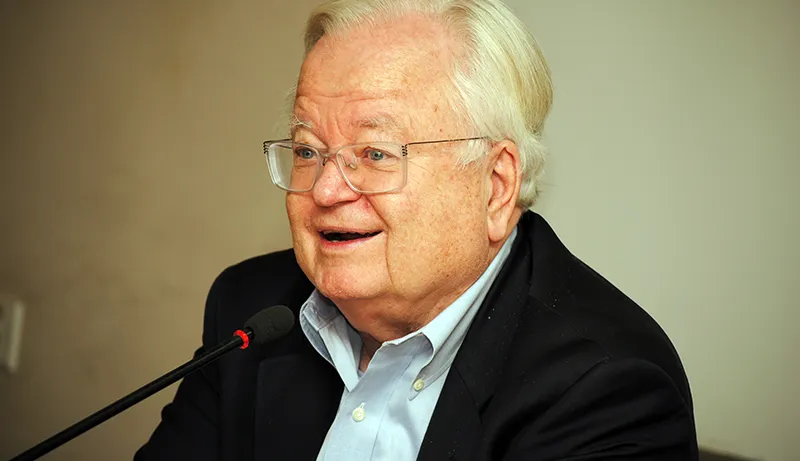-
CENTRES
Progammes & Centres
Location
The question is whether the governments of the US and China can find a way to manage their differences in a way that does not ignite tensions. No one knows the answer to this. However, managing these tensions will require a lot of diplomatic effort and energy.

The best strategy India can have to deal with a rising China is to be successful. This was one of the suggestions made by Mr. Robert Blackwill, former US Ambassador to India, during a talk on ’The Future of US-China Relations’ at Observer Research Foundation on January 11, 2013.
Mr. Blackwill started off by stating that US-China relations are both better and worse than one may think. They are better because at the abstract level, the US and China share important foreign policy objectives like fostering the global economic order; maintaining peace and stability in Asia; constraining North Korea’s nuclear weapons and missile programme; preventing nuclear proliferation; slowing down climate change; and promoting counter-terrorism. He pointed out that the US and China have as many as 60 separate governmental dialogues at the bilateral level.
He said that the idea of a G-2 should not be taken seriously and India should not feel anxious about it. This is because the US wants to maintain its primacy in Asia and this is not compatible with China’s own aspirations. There are fundamental disagreements between Washington and Beijing on the balance of power in Asia. The size of China makes it impossible for other Asian countries to balance China on their own and therefore they need the US to strike a balance; no alternative presence can be as comfortable as that of the US for them. Second, a G-2 would alarm India, Japan, Australia and other US partners. There is no reason therefore for the US to go ahead with a G-2.
Mr. Blackwill said the US’ announcement of a pivot to Asia is connected with the rise of China’s power, no matter how much the US government denies it. There are also differences of opinion between the US and China over issues of sovereignty and use of force. Moreover, there are few regimes which have the magnitude of absolutely different political systems and values as the US and China.
He also listed out some policy differences between Washington and Beijing. The first is that a majority of Americans believe that China is devaluing its currency. Second, there are differences between the two countries over arms sales to Taiwan, the Dalai Lama and the transfer of dual use technology. Third, China is reluctant to put real pressure on the North Korean regime and this is something the US wants. Fourth, they have differing opinions on the issue of the South China Seas and East China Seas, Iran and Syria. There is a lot of concern in the US about cyber security and the theft of US intellectual property. Also, on the issue of climate change, the US and China are the biggest emitters of carbon dioxide and each uses the other as an excuse for inaction.
But at the same time, US-China relations are stable due to a variety of factors. Both countries have an interest in maintaining a stable global economy and Asian economy and know that a prolonged US-China confrontation would have serious effects on both economies. Washington and Beijing want to concentrate on domestic economic challenges and both want to minimise the likelihood of a crisis in foreign policy and in US-China relations. There is also the issue of US-China trade. Though the US has a large trade deficit with China, its exports to China are growing and stands at $75 billion. China is the third largest destination for US exports after Canada and Mexico. None of the Asian countries want a confrontation between China and the US. Ambassador Blackwill pointed out that the notion of containment has a weakness in that no Asian country would openly join with the US to contain China.
There is thus a tension between strategic and operational differences on the one hand and the reasons for stability in US-China relations. The domestic political situation in each country further complicates the relations. The question is whether the two governments can find a way to manage these differences in a way that does not ignite tensions. No one knows the answer to this. However, managing these tensions will require a lot of diplomatic effort and energy.
During the question and answer session that followed, Mr. Blackwill said that the best way for the US to deal with economic coercion by China is to have a more robust economic policy vis-à-vis China. He argued that the rise of the strategic partnership between India and the US has been and will be based on China’s rise though neither government would admit to this. However, this does not mean that the US should invite or that India should aspire to join any kind of semi-alliance though if China’s behaviour becomes more aggressive, India and the US will be driven closer together. The meeting was chaired by Mr. Vikram Sood, Vice President, ORF.
(This report is prepared by Uma Purushothaman, Associate Fellow, ORF)
The views expressed above belong to the author(s). ORF research and analyses now available on Telegram! Click here to access our curated content — blogs, longforms and interviews.